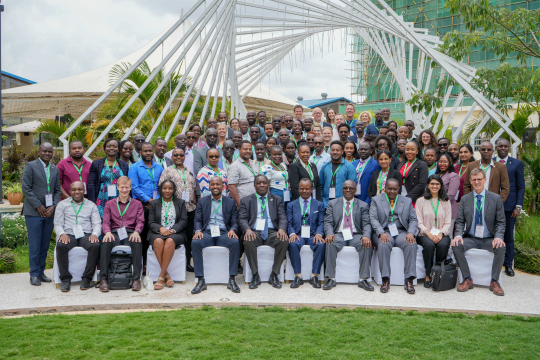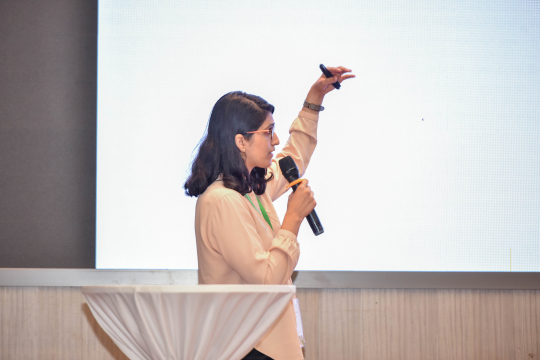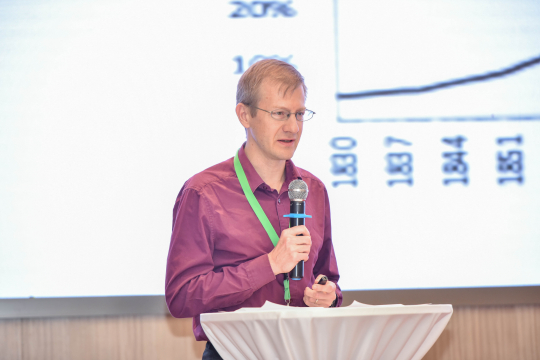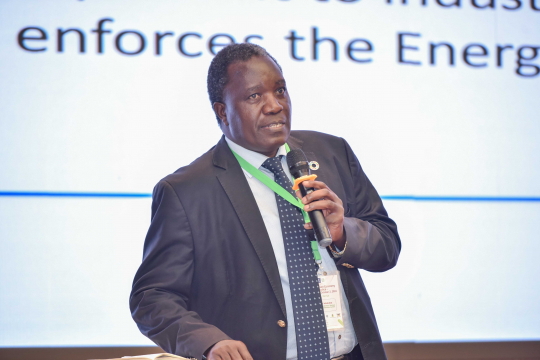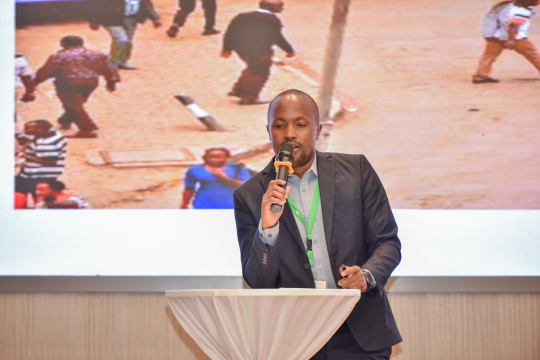EfD Kenya organized a policy workshop on October 2nd in Nairobi, which brought together researchers, civil servants, and stakeholders from the energy, transport, and industrial sectors. The event included thought-provoking keynote presentations, interactive discussion sessions where the participants shared their knowledge and experiences, and a panel discussion. This meeting concept provided a rich knowledge exchange of Policy Instruments for a Just and Inclusive Transition in the Energy, Transport, and Industrial Sectors in East Africa.
The keynote speakers included Ms. Raavi Aggarwal, Indian Statistical Institut, Delhi, Prof. Mac Juland'of Duke University, Sylvester Makaka, Kenya Association of Manufacturing (KAM), and Eng. Kelvin Ndangili (Nairobi Metropolitan Area Transport Authority, (NaMATA).
Cash transfers promote welfare
Raavi Aggarwal discusses approaches for enhancing welfare.
Raavi Aggarwal delivered a compelling keynote address on energy subsidy reform and biomass use. A key concern was the impact of carbon markets, both voluntary and compliance-based, which aim to price emissions to achieve national climate targets. She argued that cash transfers are essential to prevent welfare losses arising from carbon pricing. Recognizing the potential pitfalls of cash transfer programs, Raavi Aggarwal discussed the challenges of leakage and corruption. She suggested that leveraging financial inclusion, such as direct deposits of LPG subsidies into beneficiaries' bank accounts can help curb these issues.
Kenya is the Potential JET Lab pilot
Prof. Mac Juland highlights the financing gap in the energy transition.
Professor Mac Juland's presentation focused on the challenges and opportunities in financing and implementing a just energy transition (JET). A major challenge identified was the lack of sufficient investment in energy transition and low-carbon development, particularly in Sub-Saharan Africa, where biomass is still heavily used. Other barriers include low private sector participation in low- and middle-income countries (LMICs) and Africa's slow pace of renewable energy investment. The JET Lab was proposed to address these issues, with Kenya chosen as the pilot country. The JET Lab is a demand-driven research and capacity-building initiative aimed at increasing the volume, quality, and impact of energy transition investments in emerging economies. Insights gained from the pilot phase in Kenya will be applied to other African nations facing similar challenges.
Systems for reporting energy savings are required
Sylvester Makaka delivers a keynote address on energy efficiency in the industrial sector.
Kenya's manufacturing sector contributes about 7% of the Gross Domestic Product (GDP) and intends to increase this to 20% by 2030. The sector accounts for 60% of the country's electricity consumption and thus enhancing energy efficiency is essential to maintaining its competitiveness. However, significant gaps exist including the lack of reliable measurement, verification, and reporting of energy savings, which undermines industry confidence in energy efficiency measures. Sylvester Makaka highlights that the adoption of energy efficiency and renewable energy in Kenya’s manufacturing sector is crucial not only for reducing operational costs and boosting competitiveness but also for driving broader economic growth.
Matatu drivers and conductors transition to green transport
Kelvin Ndangili outlines the BRT and Electric Vehicle (EV) workforce transition strategy.
The discussions also touched on strategies that will ensure a just transition within the transport sector. Key components included reskilling and upskilling workers from the Matatu sector for roles in managing, operating, and maintaining Bus Rapid Transit (BRT) and Electric Vehicle (EV) systems. The implementation process will be gradual allowing workers to adapt and thus preventing sudden job losses. Informal workers, such as conductors, will be transitioned into formal roles within the BRT and EV operations. The initiative will also create green jobs in areas such as EV maintenance, charging infrastructure, and renewable energy. Furthermore, resettlement and social safety nets will be put in place to support displaced workers by offering compensation and financial assistance. Finally, continuous stakeholder engagement with public transport operators, community leaders, and civil society will ensure that the concerns of affected workers and communities are properly addressed.
"Low Emission Vehicles alone won't address both emissions and congestion," stated Kelvin Ndangili.
”For an effective low-carbon transport system, it's essential to improve public transportation to encourage greater use of mass transit. In addition, developing Sustainable Urban Mobility Plans (SUMPs) is crucial as a foundation for the rollout of electric buses and other low-carbon transport options, such as non-motorized transport (NMT)”.
Knowledge sharing in group discussions
The participants were then divided into groups of about ten people each, including civil servants from Ethiopia, Kenya, Rwanda, Tanzania, and Uganda, researchers, stakeholders, and other experts. The discussions focused on three themes: Energy access and equity, Sustainable and inclusive transport systems, and energy efficiency in the industrial sector.
“It has been an excellent interactive session with lots of knowledge sharing,” said Mary Mahumi from Tanzania Forest Services.
The group session was followed by a panel discussion with prominent experts: The panel session brought together: Dr. Abebe Byene (Policy Studies Institute, Ethiopia), Dr. Kenneth Kigundu (University of Chuka, Kenya), Ms. Maureen Anino (Ministry of Water and Environment, Uganda), Mr. Fred Sabiti (Ministry of Finance and Economic Planning, Rwanda), Ms. June Nyakahuma (Ministry of Finance, Planning and Economic Development, Uganda)
By Jane Maina
